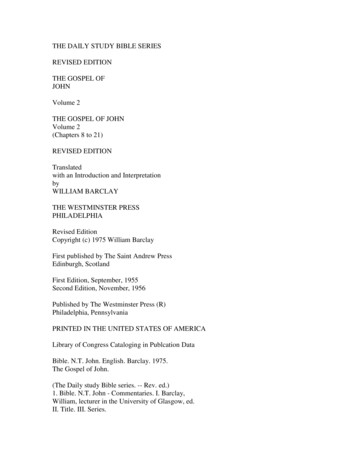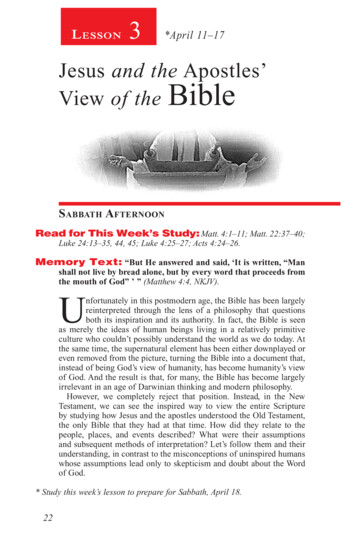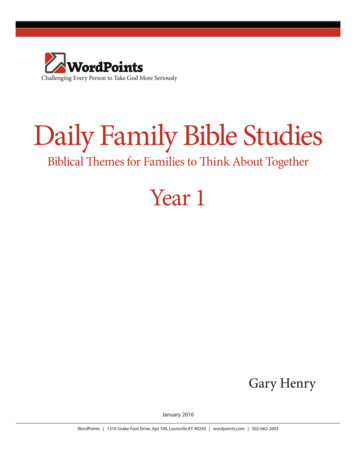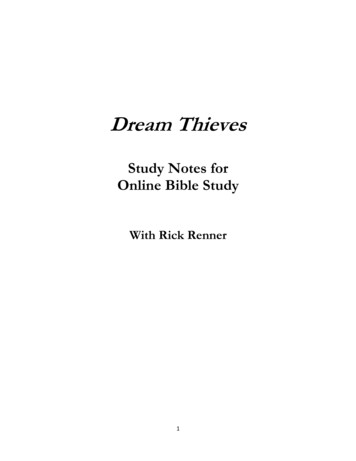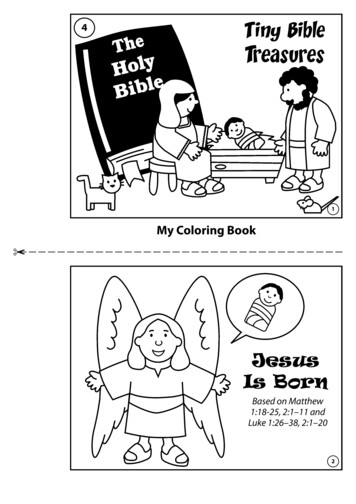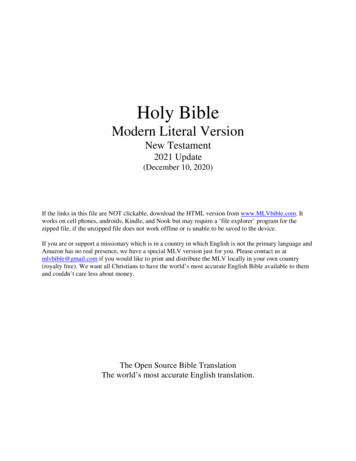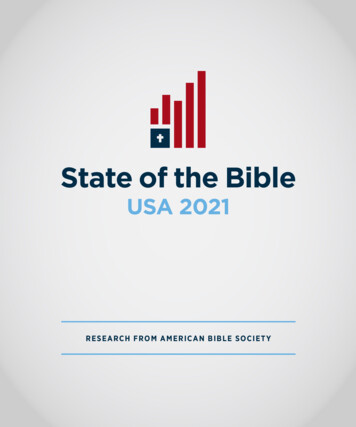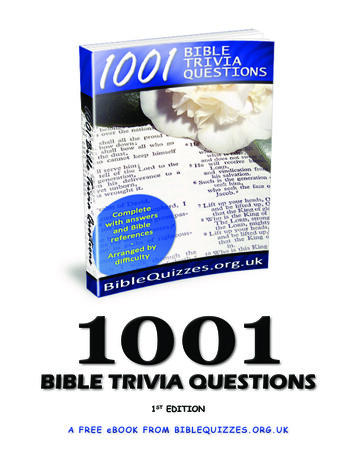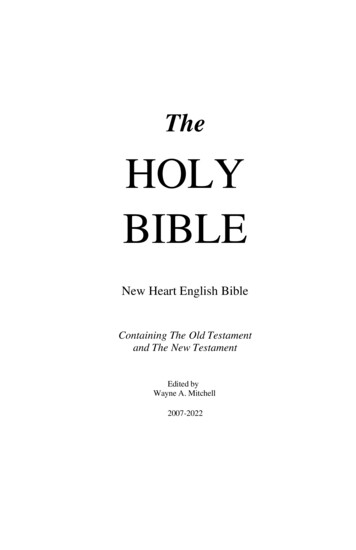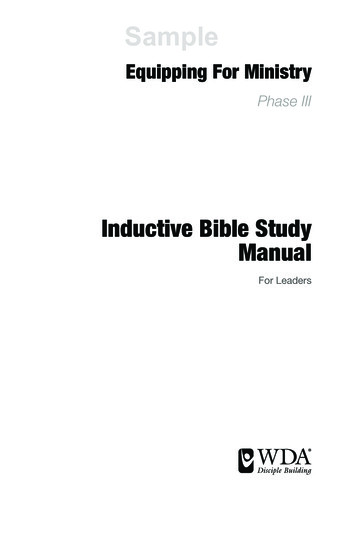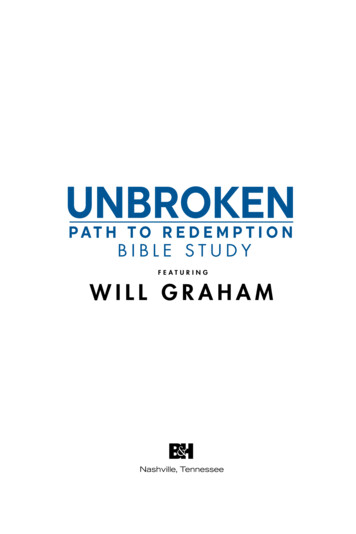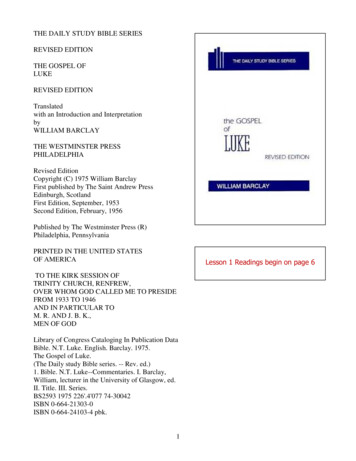
Transcription
THE DAILY STUDY BIBLE SERIESREVISED EDITIONTHE GOSPEL OFLUKEREVISED EDITIONTranslatedwith an Introduction and InterpretationbyWILLIAM BARCLAYTHE WESTMINSTER PRESSPHILADELPHIARevised EditionCopyright (C) 1975 William BarclayFirst published by The Saint Andrew PressEdinburgh, ScotlandFirst Edition, September, 1953Second Edition, February, 1956Published by The Westminster Press (R)Philadelphia, PennsylvaniaPRINTED IN THE UNITED STATESOF AMERICALesson 1 Readings begin on page 6TO THE KIRK SESSION OFTRINITY CHURCH, RENFREW,OVER WHOM GOD CALLED ME TO PRESIDEFROM 1933 TO 1946AND IN PARTICULAR TOM. R. AND J. B. K.,MEN OF GODLibrary of Congress Cataloging In Publication DataBible. N.T. Luke. English. Barclay. 1975.The Gospel of Luke.(The Daily study Bible series. -- Rev. ed.)1. Bible. N.T. Luke--Commentaries. I. Barclay,William, lecturer in the University of Glasgow, ed.II. Title. III. Series.BS2593 1975 226'.4'077 74-30042ISBN 0-664-21303-0ISBN 0-664-24103-4 pbk.1
GENERAL INTRODUCTIONThe Daily Study Bible series has always had one aim--to convey the results of scholarship to theordinary reader. A. S. Peake delighted in the saying that he was a "theological middleman ", and Iwould be happy if the same could be said of me in regard to these volumes. And yet the primaryaim of the series has never been academic. It could be summed up in the famous words ofRichard of Chichester's prayer--to enable men and women "to know Jesus Christ more clearly, tolove him more dearly, and to follow him more nearly".It is all of twenty years since the first volume of The Daily Study Bible was published. Theseries was the brain-child of the late Rev. Andrew McCosh, M.A., S.T.M., the then Secretary andManager of the Committee on Publications of the Church of Scotland, and of the late Rev. R. G.Macdonald, O.B.E., M.A., D.D., its Convener.It is a great joy to me to know that all through the years The Daily Study Bible has been used athome and abroad, by minister, by missionary, by student and by layman, and that it has beentranslated into many different languages. Now, after so many printings, it has become necessaryto renew the printer's type and the opportunity has been taken to restyle the books, to correctsome errors in the text and to remove some references which have become outdated. At the sametime, the Biblical quotations within the text have been changed to use the Revised StandardVersion, but my own original translation of the New Testament passages has been retained at thebeginning of each daily section.There is one debt which I would be sadly lacking in courtesy if I did not acknowledge. Thework of revision and correction has been done entirely by the Rev. James Martin, M.A., B.D.,Minister of High Carntyne Church, Glasgow. Had it not been for him this task would never havebeen undertaken, and it is impossible for me to thank him enough for the selfless toil he has putinto the revision of these books.It is my prayer that God may continue to use The Daily Study Bible to enable men better tounderstand His word.Glasgow WILLIAM BARCLAY2
TABLE OF CONTENTSGeneral IntroductionIntroduction to LukeAn Historian's Introduction (Lk.1:1-4)A Son is Promised (Lk.1:5-25)God's Message to Mary (Lk.1:26-38)The Paradox of Blessedness (Lk.1:39-45)A Wondrous Hymn (Lk.1:46-56)His Name is John (Lk.1:57-66)A Father's Joy (Lk.1:67-80)Journey to Bethlehem (Lk.2:1-7)Shepherds and Angels (Lk.2:8-20)The Ancient Ceremonies are Observed (Lk.2:21-24)A Dream Realized (Lk.2:25-35)A Lovely Old Age (Lk.2:36-40)The Dawning Realization (Lk.2:41-52)The Courier of the King (Lk.3:1-6)John's Summons to Repentance (Lk.3:7-18)The Arrest of John (Lk.3:19-20)The Hour Strikes for Jesus (Lk.3:21-22)The Lineage of Jesus (Lk.3:23-38)The Battle with Temptation (Lk.4:1-13)The Galilaean Springtime (Lk.4:14-15)Without Honour in his Own Country (Lk.4:16-30)The Spirit of an Unclean Devil (Lk.4:31-37)A Miracle in a Cottage (Lk.4:38-39)The Insistent Crowds (Lk.4:40-44)The Conditions of a Miracle (Lk.5:1-11)Touching the Untouchable (Lk.5:12-15)The Opposition Intensifies (Lk.5:16-17)Forgiven and Healed (Lk.5:18-26)The Guest of an Outcast (Lk.5:27-32)The Happy Company (Lk.5:33-35)The New Idea (Lk.5:36-39)The Increasing Opposition (Lk.6:1-5)The Defiance of Jesus (Lk.6:6-11)Jesus Chooses his Men (Lk.6:12-19)The End of the World's Values (Lk.6:20-26)The Golden Rule (Lk.6:27-38)Rules for Life and Living (Lk.6:39-46)The Only Sure Foundation (Lk.6:47-49)A Soldier's Faith (Lk.7:1-10)The Compassion of Christ (Lk.7:11-17)The Final Proof (Lk.7:18-29)The Perversity of Men (Lk.7:30-35)A Sinner's Love (Lk.7:36-50)3
On the Road (Lk.8:1-3)The Sower and the Seed (Lk.8:4-15)Laws for Life (Lk.8:16-18)True Kinship (Lk.8:19-21)Calm Amidst the Storm (Lk.8:22-25)The Defeat of the Demons (Lk.8:26-39)An Only Child is Healed (Lk.8:40-42,49-56)Not Lost in the Crowd (Lk.8:43-48)Emissaries of the King (Lk.9:1-9)Food for the Hungry (Lk.9:10-17)The Great Discovery (Lk.9:18-22)The Conditions of Service (Lk.9:23-27)The Mountain Top of Glory (Lk.9:28-36)Coming Down from the Mount (Lk.9:37-45)True Greatness (Lk.9:46-48)Two Lessons in Tolerance (Lk.9:49-56)The Honesty of Jesus (Lk.9:57-62)Labourers for the Harvest (Lk.10:1-16)A Man's True Glory (Lk.10:17-20)The Unsurpassable Claim (Lk.10:21-24)Who is My Neighbour? (Lk.10:25-37)The Clash of Temperaments (Lk.10:38-42)Teach us to Pray (Lk.11:1-4)Ask and You will Receive (Lk.11:5-13)A Malicious Slander (Lk.11:14-23)The Peril of the Empty Soul (Lk.1 1:24-28)The Responsibility of Privilege (Lk.11:29-32)The Darkened Heart (Lk.11:3 3-36)The Worship of Details and the Neglect of the Things that Matter (Lk.11:37-44)The Sins of the Legalists (Lk.11:45-54)The Creed of Courage and of Trust (Lk.12:1-12)The Place of Material Possessions in Life (Lk.12:13-34)Be Prepared (Lk.12:35-48)The Coming of the Sword (Lk.12:49-53)While Yet there is Time (Lk.12:54-59)Suffering and Sin (Lk.13:1-5)The Gospel of the Other Chance and the Threat of the Last Chance (Lk.13:6-9)Mercy More than Law (Lk.13:10-17)The Empire of Christ (Lk.1 3:18-19)The Leaven of the Kingdom (Lk.13:20-21)The Risk of being Shut Out (Lk.13:22-30)Courage and Tenderness (Lk.13:31-35)Under the Scrutiny of Hostile Men (Lk.14:1-6)The Necessity of Humility (Lk.14:7-11)Disinterested Charity (Lk.14:12-14)The King's Banquet and the King's Guests (Lk.14:15-24)On Counting the Cost (Lk.14:25-33)The Insipid Salt (Lk.14:34-35)The Shepherd's Joy (Lk.15:1-7)The Coin a Woman Lost and Found (Lk.15:8-10)4
The Story of the Loving Father (Lk.15:11-32)A Bad Man's Good Example (Lk.16:1-13)The Law which does not Change (Lk.16:14-18)The Punishment of the Man who Never Noticed (Lk.16:19-31)Laws of the Christian Life (Lk.17:1-10)The Rarity of Gratitude (Lk.17:11-19)The Signs of his Coming (Lk.17:20-37)Unwearied in Prayer (Lk.1 8:1-8)The Sin of Pride (Lk.18:9-14)The Master and the Children (Lk.18:15-17)The Man who would not Pay the Price (Lk.18:18-30)The Waiting Cross (Lk.18:31-34)The Man who would not be Silenced (Lk.18:35-43)The Guest of the Man whom All Men Despised (Lk.19:1-10)The King's Trust in his Servants (Lk.19:11-27)The Entry of the King (Lk.19:28-40)The Pity and the Anger of Jesus (Lk.19:41-48)By What Authority? (Lk.20:1-8)A Parable which was a Condemnation (Lk.20:9-18)Caesar and God (Lk.20:19-26)The Sadducees' Question (Lk.20:27-40)The Warnings of Jesus (Lk.20:41-44)The Love of Honour among Men (Lk.20:45-47)The Precious Gift (Lk.21:1-4)Tidings of Trouble (Lk.21:5-24)Watch (Lk.21:25-37)And Satan entered into Judas (Lk.22:1-6)The Last Meal Together (Lk.22:7-23)Strife among the Disciples of Christ (Lk.22:24-30)Peter's Tragedy (Lk.22:31-38,54-62)Thy Will be Done (Lk.22:39-46)The Traitor's Kiss (Lk.22:47-53)Mocking and Scourging and Trial (Lk.22:63-71)Trial Before Pilate and Silence Before Herod (Lk.23:1-12)The Jews' Blackmail of Pilate (Lk.23:13-25)The Road to Calvary (Lk.23:26-31)Here they Crucified him (Lk.23:32-38)The Promise of Paradise (Lk.23:39-43)The Long Day Closes (Lk.23:44-49)The Man who gave Jesus a Tomb (Lk.23:50-56)The Wrong Place to Look (Lk.24:1-12)The Sunset Road that Turned to Dawn (Lk.24:13-35)In the Upper Room (Lk.24:36-49)The Happy Ending (Lk.24:50-53)Further Reading5
Lesson 1 ReadingsINTRODUCTION TO THE GOSPELACCORDING TO SAINT LUKEA LOVELY BOOK AND ITS AUTHORThe gospel according to St. Luke has been called the loveliest book in the world. When once anAmerican asked him if he could recommend a good life of Christ, Denney answered, "Have you triedthe one that Luke wrote?" There is a legend that Luke was a skilled painter; there is even a painting ofMary in a Spanish cathedral to this day which purports to be by him. Certainly he had an eye for vividthings. It would not be far wrong to say that the third gospel is the best life of Christ ever written.Tradition has always believed that Luke was the author and we need have no qualms in accepting thattradition. In the ancient world it was the regular thing to attach books to famous names; no one thoughtit wrong. But Luke was never one of the famous figures of the early Church. If he had not written thegospel no one would have attached it to his name.Luke was a gentile; and he has the unique distinction of being the only New Testament writer who wasnot a Jew. He was a doctor by profession (Col.4:14) and maybe that very fact gave him the widesympathy he possessed. It has been said that a minister sees men at their best; a lawyer sees men attheir worst; and a doctor sees men as they are. Luke saw men and loved them all.The book was written to a man called Theophilus. He is called most excellent Theophilus and the titlegiven him is the normal title for a high official in the Roman government. No doubt Luke wrote it totell an earnest inquirer more about Jesus; and he succeeded in giving Theophilus a picture which musthave thirled his heart closer to the Jesus of whom he had heard.THE SYMBOLS OF THE GOSPELSEvery one of the four gospels was written from a certain point of view. Very often on stained glasswindows the writers of the gospels are pictured; and usually to each there is attached a symbol. Thesymbols vary but one of the commonest allocations is this.The emblem of Mark is a man. Mark is the simplest and most straightforward of the gospels. It hasbeen well said that its characteristic is realism. It is the nearest to being a report of Jesus' life.The emblem of Matthew is a lion. Matthew was a Jew writing for Jews and he saw in Jesus theMessiah, the lion of the tribe of Judah, the one whom all the prophets had predicted.The emblem of John is the eagle. The eagle can fly higher than any other bird. It is said that of allcreatures only the eagle can look straight into the sun. John is the theological gospel; its flights ofthought are higher than those of any of the others. It is the gospel where the philosopher can findthemes to think about for a lifetime and to solve only in eternity.6
The symbol of Luke is the calf The calf is the animal for sacrifice; and Luke saw in Jesus the sacrificefor all the world. In Luke above all, the barriers are broken down and Jesus is for Jew and gentile, saintand sinner alike. He is the saviour of the world. Keeping that in mind, let us now set down thecharacteristics of this gospel.AN HISTORIAN'S CAREFirst and foremost, Luke's gospel is an exceedingly careful bit of work. His Greek is notably good. Thefirst four verses are well-nigh the best Greek in the New Testament. In them he claims that his work isthe product of the most careful research. His opportunities were ample and his sources must have beengood. As the trusted companion of Paul he must have known all the great figures of the church, and wemay be sure that he had them tell their stories to him. For two years he was Paul's companion inimprisonment in Caesarea. In those long days he had every opportunity for study and research and hemust have used them well.An example of Luke's care is the way in which he dates the emergence of John the Baptist. He does soby no fewer than six contemporary datings. "In the fifteenth year of the reign of Tiberius Caesar (1),Pontius Pilate being governor of Judaea (2), Herod being tetrarch of Galilee (3), and his brother Philipbeing tetrarch of the region of Ituraea and Trachonitis (4), and Lysanias tetrarch of Abilene (5) in thehigh priesthood of Annas and Caiaphas (6), the word of God came to John" (Lk.3:1-2). Here is a manwho is writing with care and who will be as accurate as it is possible for him to be.THE GOSPEL FOR THE GENTILESIt is clear that Luke wrote mainly for gentiles. Theophilus was a gentile, as was Luke himself, andthere is nothing in the gospel that a gentile could not grasp and understand. (a) As we have seen, Lukebegins his dating from the reigning Roman emperor and the current Roman governor. The Roman datecomes first. (b) Unlike Matthew, he is not greatly interested in the life of Jesus as the fulfilment ofJewish prophecy. (c) He very seldom quotes the Old Testament at all. (d) He has a habit of givingHebrew words in their Greek equivalent so that a Greek would understand. Simon the Cananaeanbecomes Simon the Zealot. (compare Lk.6:15 and Matt.10:4). Calvary is called not by its Hebrewname, Golgotha (compare HSN1538 and HSN1556), but by its Greek name, Kranion (GSN2898).Both mean the place of a skull. He never uses the Jewish term Rabbi (HSN7227) of Jesus but always aGreek word meaning Master. When he is tracing the descent of Jesus, he traces it not to Abraham, thefounder of the Jewish race, as Matthew does, but to Adam, the founder of the human race. (compareMatt.1:2 and Lk.3:38).Because of this Luke is the easiest of all the gospels to read. He was writing, not for Jews, but forpeople very like ourselves.7
THE GOSPEL OF PRAYERLuke's gospel is specially the gospel of prayer. At all the great moments of his life, Luke shows usJesus at prayer. He prayed at his baptism (Lk.3:21); before his first collision with the Pharisees(Lk.5:16); before he chose the Twelve (Lk.6:12); before he questioned his disciples as to who theythought he was; before his first prediction of his own death (Lk.9:18); at the Transfiguration (Lk.9:29);and upon the Cross (Lk.23:46). Only Luke tells us that Jesus prayed for Peter in his hour of testing(Lk.22:32). Only he tells us the prayer parables of the Friend at Midnight (Lk.11:5-13) and the UnjustJudge (Lk.18:1-8). To Luke the unclosed door of prayer was one of the most precious in all the world.THE GOSPEL OF WOMENIn Palestine the place of women was low. In the Jewish morning prayer a man thanks God that he hasnot made him "a gentile, a slave or a woman." But Luke gives a very special place to women. The birthnarrative is told from Mary's point of view. It is in Luke that we read of Elizabeth, of Anna, of thewidow at Nain, of the woman who anointed Jesus' feet in the house of Simon the Pharisee. It is Lukewho makes vivid the pictures of Martha and Mary and of Mary Magdalene. It is very likely that Lukewas a native of Macedonia where women held a more emancipated position than anywhere else; andthat may have something to do with it.THE GOSPEL OF PRAISEIn Luke the phrase "praising God" occurs oftener than in all the rest of the New Testament puttogether. This praise reaches its peak in the three great hymns that the church has sung throughout allher generations--the Magnificat (Lk.1:46-55); the Benediclus (Lk.1:68-79); and the Nunc Dimittis(Lk.2:29-32). There is a radiance in Luke's gospel which is a lovely thing, as if the sheen of heaven hadtouched the things of earth.THE UNIVERSAL GOSPELBut the outstanding characteristic of Luke is that it is the universal gospel. All the barriers are down;Jesus Christ is for all men without distinction.(a) The kingdom of heaven is not shut to the Samaritans (Lk.9:51-56). Luke alone tells the parable ofthe Good Samaritan (Lk.10:30-37). The one grateful leper is a Samaritan (Lk.17:11-19). John canrecord a saying that the Jews have no dealings with the Samaritans (Jn.4:9). But Luke refuses to shutthe door on any man.(b) Luke shows Jesus speaking with approval of gentiles whom the orthodox Jew would haveconsidered unclean. He shows us Jesus citing the widow of Zarephath and Naaman the Syrian asshining examples (Lk.4:25-27). The Roman centurion is praised for the greatness of his faith (Lk.7:9).Luke tells us of that great word of Jesus, "Men will come from east and west, and from north andsouth, and sit at the table in the kingdom of God" (Lk.13:29).8
(c) Luke is supremely interested in the poor. When Mary brings the offering for her purification it isthe offering of the poor (Lk.2:24). When Jesus is, as it were, setting out his credentials to theemissaries of John, the climax is, "The poor have good news preached to them" (Lk.7:22). He alonetells the parable of the Rich Man and the Poor Man (Lk.16:19-31). In Luke's account of the Beatitudesthe saying of Jesus runs, not, as in Matthew (Matt.5:3), "Blessed are the poor in spirit," but simply,"Blessed are you poor" (Lk.6:20). Luke's gospel has been called "the gospel of the underdog." Hisheart runs out to everyone for whom life is an unequal struggle.(d) Above all Luke shows Jesus as the friend of outcasts and sinners. He alone tells of the woman whoanointed Jesus' feet and bathed them with her tears and wiped them with her hair in the house of Simonthe Pharisee (Lk.7:36-50); of Zacchaeus, the quisling tax-gatherer (Lk.19:1-10); of the Penitent Thief(Lk.23:43); and he alone has the immortal story of the prodigal son and the loving father (Lk.15:1132). When Matthew tells how Jesus sent his disciples out to preach, he says that Jesus told them not togo to the Samaritans or the gentiles (Matt.10:5); but Luke omits that altogether. All four gospel writersquote from Isa.40 when they give the message of John the Baptist, "Prepare the way of the Lord; makestraight in the desert a highway for our God"; but only Luke continues the quotation to its triumphantconclusion, "And all flesh shall see the salvation of God" (Isa.40:3-5; Matt.3:3; Mk.1:3; Jn.1:23;Lk.3:4,6). Luke of all the gospel writers sees no limits to the love of God.THE BOOK BEAUTIFULAs we study this book we must look for these characteristics. Somehow of all the gospel writers onewould have liked to meet Luke best of all, for this gentile doctor with the tremendous vision of theinfinite sweep of the love of God must have been a lovely soul. Faber wrote the lines,There's a wideness in God's mercy, Like the wideness of the sea; There's a kindness in his justice,Which is more than liberty. For the love of God is broader Than the measures of man's mind; And theheart of the Eternal Is most wonderfully kind.Luke's gospel is the demonstration that this is true.LUKEAN HISTORIAN'S INTRODUCTIONLk.1:1-4Since many have set their hands to the task of drawing up an account of the events which werecompleted amongst us, telling the story just as those who were the original eye-witnesses and whobecame the servants of the word handed it down to us, I too made up my mind to carry out acareful investigation of all things from the beginning, and to write to you, Theophilus, yourexcellency, an orderly account of them, so that you might have in your mind a full and reliableaccount of the things in which you have been instructed.Luke's introduction is unique in the first three gospels because it is the only place where the authorsteps out upon the stage and uses the pronoun "I." There are three things to note in this passage.(i) It is the best bit of Greek in the New Testament. Luke uses here the very form of introduction whichthe great Greek historians all used. Herodotus begins, "These are the researches of Herodotus of9
Halicarnassus." A much later historian, Dionysius of Halicarnassus, tells us at the beginning of hishistory, "Before beginning to write I gathered information, partly from the lips of the most learned menwith whom I came into contact, and partly from histories written by Romans of whom they spoke withpraise." So Luke, as he began his story in the most sonorous Greek, followed the highest models hecould find.It is as if Luke said to himself, "I am writing the greatest story in the world and nothing but the best isgood enough for it." Some of the ancient manuscripts are very beautiful productions, written in silverink on purple vellum; and often the scribe, when he came to the name of God or of Jesus, wrote it ingold. Dr. Boreham tells of an old workman who, every Friday night, took the newest and shiniest coinsout of his pay packet for Sunday's offering in church. The historian, the scribe and the workman wereall filled with the same idea--only the best is good enough for Jesus. They always gave their utmost forthe highest.(ii) It is most significant that Luke was not satisfied with anyone else's story of Christ. He must havehis own. Real religion is never a second-hand thing. It is a personal discovery. Professor Arthur Gossipof Trinity College, Glasgow used to say that the four gospels were important, but beyond them allcame the gospel of personal experience. Luke had to rediscover Jesus Christ for himself.(iii) There is no passage of the Bible which sheds such a floodlight on the doctrine of the inspiration ofscripture. No one would deny that the gospel of Luke is an inspired document; and yet Luke begins byaffirming that it is the product of the most careful historical research. God's inspiration does not cometo the man who sits with folded hands and lazy mind and only waits, but to the man who thinks andseeks and searches. True inspiration comes when the seeking mind of man joins with the revealingSpirit of God. The word of God is given, but it is given to the man who is seeking for it. "Seek and youshall find" (Matt.7:7).A SON IS PROMISEDLk.1:5-25In the time of Herod, the king of Judaea, there was a priest called Zacharias, who belonged to thesection of Abia. His wife was also a direct descendant of Aaron and her name was Elizabeth. Both ofthem were good people before God, for they walked blamelessly in all the commandments andordinances of the Lord. They had no child because Elizabeth was barren and both of them were faradvanced in years. When he was acting as priest before God, when his section was on duty, inaccordance with the custom of priestly duty, it fell to him by lot to go into the Temple of the Lordto burn the incense. The whole congregation of the people was praying outside at the hour whenincense was offered. The angel of the Lord appeared to him, standing at the right side of the altarof incense. When Zacharias saw him he was deeply moved and awe fell upon him. The angel said tohim, "Do not be afraid, Zacharias, because your request has been heard and your wife Elizabeth willbear you a son and you must call him by the name of John. You will have joy and exultation andmany will rejoice at his birth. He will be great in God's sight; he must not drink wine or strong drinkand, even from the time he is in his mother's womb, he will be filled with the Holy Spirit. He willturn many sons of Israel to the Lord their God; and he himself will go before his face in the spiritand the power of Elijah, to turn the hearts of the fathers to the children, and the disobedient to thewisdom of the just, to get ready a people prepared for the Lord." Zacharias said to the angel, "Howwill I know that this is going to happen? For I am an old man and my wife is far advanced in years."10
"I am Gabriel," the angel answered, "who stands before God, and I have been sent to speak to youand to tell you this good news. And--look you--you will be silent and unable to speak until the daythese things happen, because you did not believe my words which will be fulfilled in their owntime." The people were waiting for Zacharias and they were surprised that he was lingering so longin the Temple. When he came out he was not able to speak to them and they realized that he hadseen a vision in the Temple. He kept making signs to them but he remained unable to speak. Whenthe days of his time of service were completed he went away to his own home. After these daysElizabeth his wife conceived; and she hid herself for five months. "This is God's doing for me," shesaid, when he looked upon me to take away my shame among men.Zacharias, the central character in this scene, was a priest. He belonged to the section of Abia. Everydirect descendant of Aaron was automatically a priest. That meant that for all ordinary purposes therewere far too many priests. They were therefore divided into twenty-four sections. Only at the Passover,at Pentecost and at the Feast of Tabernacles did all the priests serve. For the rest of the year eachcourse served two periods of one week each. Priests who loved their work looked forward to that weekof service above all things; it was the highlight of their lives.A priest might marry only a woman of absolutely pure Jewish lineage. It was specially meritorious tomarry a woman who was also a descendant of Aaron, as was Elizabeth, the wife of Zacharias.There was as many as twenty thousand priests altogether and so there were not far short of a thousandin each section. Within the sections all the duties were allocated by lot. Every morning and eveningsacrifice was made for the whole nation. A burnt offering of a male lamb, one year old, without spot orblemish was offered, together with a meat offering of flour and oil and a drink offering of wine. Beforethe morning sacrifice and after the evening sacrifice incense was burned on the altar of incense so that,as it were, the sacrifices might go up to God wrapped in an envelope of sweet-smelling incense. It wasquite possible that many a priest would never have the privilege of burning incense all his life; but ifthe lot did fall on any priest that day was the greatest day in all his life, the day he longed for anddreamed of. On this day the lot fell on Zacharias and he would be thrilled to the core of his being.But in Zacharias's life there was tragedy. He and Elizabeth were childless. The Jewish Rabbis said thatseven people were excommunicated from God and the list began, "A Jew who has no wife, or a Jewwho has a wife and who has no child." Childlessness was a valid ground for divorce. Not unnaturallyZacharias, even on his great day, was thinking of his personal and domestic tragedy and was prayingabout it. Then the wondrous vision came and the glad message that, even when hope was dead, a sonwould be born to him.The incense was burned and the offering made in the inmost court of the Temple, the Court of thePriests. While the sacrifice was being made, the congregation thronged the next court, the Court of theIsraelites. It was the privilege of the priest at the evening sacrifice to come to the rail between the twocourts after the incense had been burned in order to bless the people. The people marvelled thatZacharias was so long delayed. When he came he could not speak and the people knew that he hadseen a vision. So in a wordless daze of joy Zacharias finished his week's duty and went home; and thenthe message of God came true and Elizabeth knew she was going to have a child.One thing stands out here. It was in God's house that God's message came to Zacharias. We may oftenwish that a message from God would come to us. In Shaw's play, Saint Joan, Joan hears voices fromGod. The Dauphin is annoyed. "Oh, your voices, your voices," he said, "Why don't the voices come tome? I am king not you." "They do come to you," said Joan, "but you do not hear them. You have not11
sat in the field in the evening listening for them. When the angelus rings you cross yourself and havedone with it; but if you prayed from your heart, and listened to the thrilling of the bells in the air afterthey stop ringing, you would hear the voices as well as I do." Joan gave herself the chance to hearGod's voice. Zacharias was in the Temple waiting on God. God's voice comes to those who listen forit--as Zacharias did--in God's house.GOD'S MESSAGE TO MARYLk.1:26-38In the sixth month the angel Gabriel was sent from God to a town of Galilee called Nazareth, to amaiden who was betrothed to a man called Joseph, who belonged to the house of David. Themaiden's name was Mary. He came in to her and said, "Greetings, most favoured one. The Lord iswith you." She was deeply moved at this word and wondered what a greeting like that could mean.The angel said to her, "Do not be afraid, Mary, for you have found favour in God's sight. Look you-you will conceive and you will bear a son and you must call him by the name of Jesus. He will begreat and he will be called the Son of the Most High; and the Lord God will give him the throne ofDavid his father; and he will rule over the house of Jacob forever, and there will be no end to hiskingdom." Mary said to the angel, "How can this be since I do not know a man?" The angelanswered, "The Holy Spirit will come upon you and the Spirit of the Most High will overshadowyou, and so the child who will be born will be called holy, the Son of God, and--look you--Elizabeth,too, your kinswoman has also conceived in her old age; and this is now the sixth month for her whois called barren, because there is nothing which is impossible with God." Mary said, "I am the Lord'sservant. Whatever he says, I accept." And the angel went away from her.Mary was betrothed to Joseph. Betrothal lasted for a year and was quite as binding as marriage. Itcould be dissolved only by divorce. Should the man to whom a girl was betrothed die, in the eyes ofthe law she was a widow. In the law there occurs the strange-sounding phrase, "a virgin who is awidow."In this passage we are face to face with one of the great controversial doctrines of the Christian faith-the Virgin Birth. The church does not insist that we believe in this doctrine. Let us look at the reasonsfor and against believing in it, and then we may make our own decision.There are two great re
The Daily Study Bible series has always had one aim--to convey the results of scholarship to the ordinary reader. A. S. Peake delighted in the saying that he was a "theological middleman ", and I would be happy if the same could be said of me in regard to these volumes. And yet the primary aim of the series has never been academic.File Size: 1MB
